Employability Skills Report: Reflective Models and Skills Development
VerifiedAdded on 2023/01/03
|9
|2408
|75
Report
AI Summary
This report delves into the critical domain of employability skills, crucial for students' academic and professional development. It introduces the concept of employability, emphasizing the significance of soft skills in communication and coordination. The report employs two key reflective models: Kolb's learning cycle, which outlines stages of concrete experience, reflective observation, abstract conceptualization, and active experimentation, and Gibbs' reflective cycle, which explores the process of learning through description, feelings, evaluation, analysis, conclusion, and action planning. The report also outlines various employability skills, including foundational, interpersonal, communication, and teamwork skills, emphasizing their role in enhancing career prospects. The author identifies their own learning style and skills gaps, underscoring the importance of continuous skill development for future professional growth. It concludes that identifying and addressing skill deficiencies, supported by reflective models, is essential for succeeding in various professional environments.
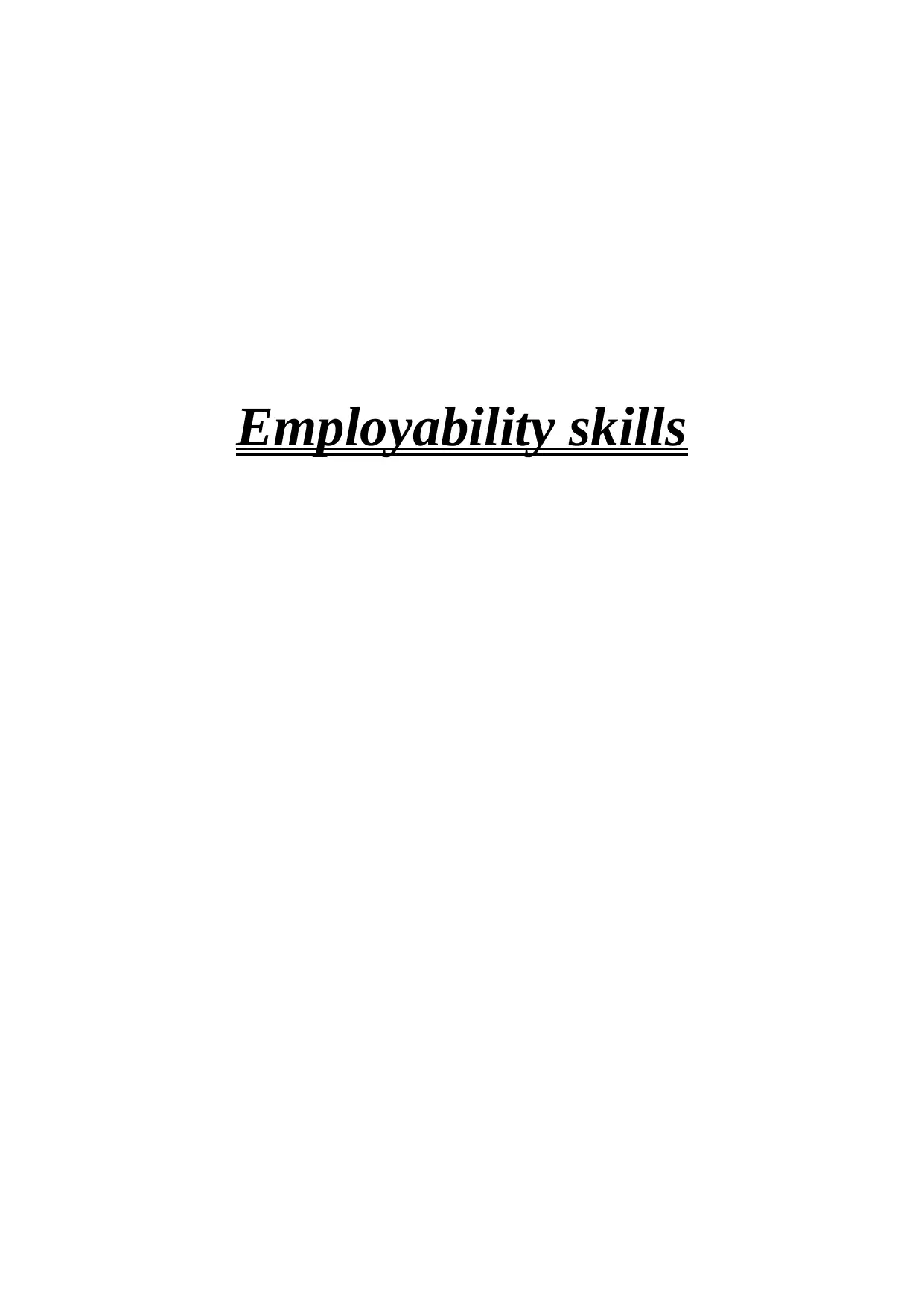
Employability skills
Paraphrase This Document
Need a fresh take? Get an instant paraphrase of this document with our AI Paraphraser
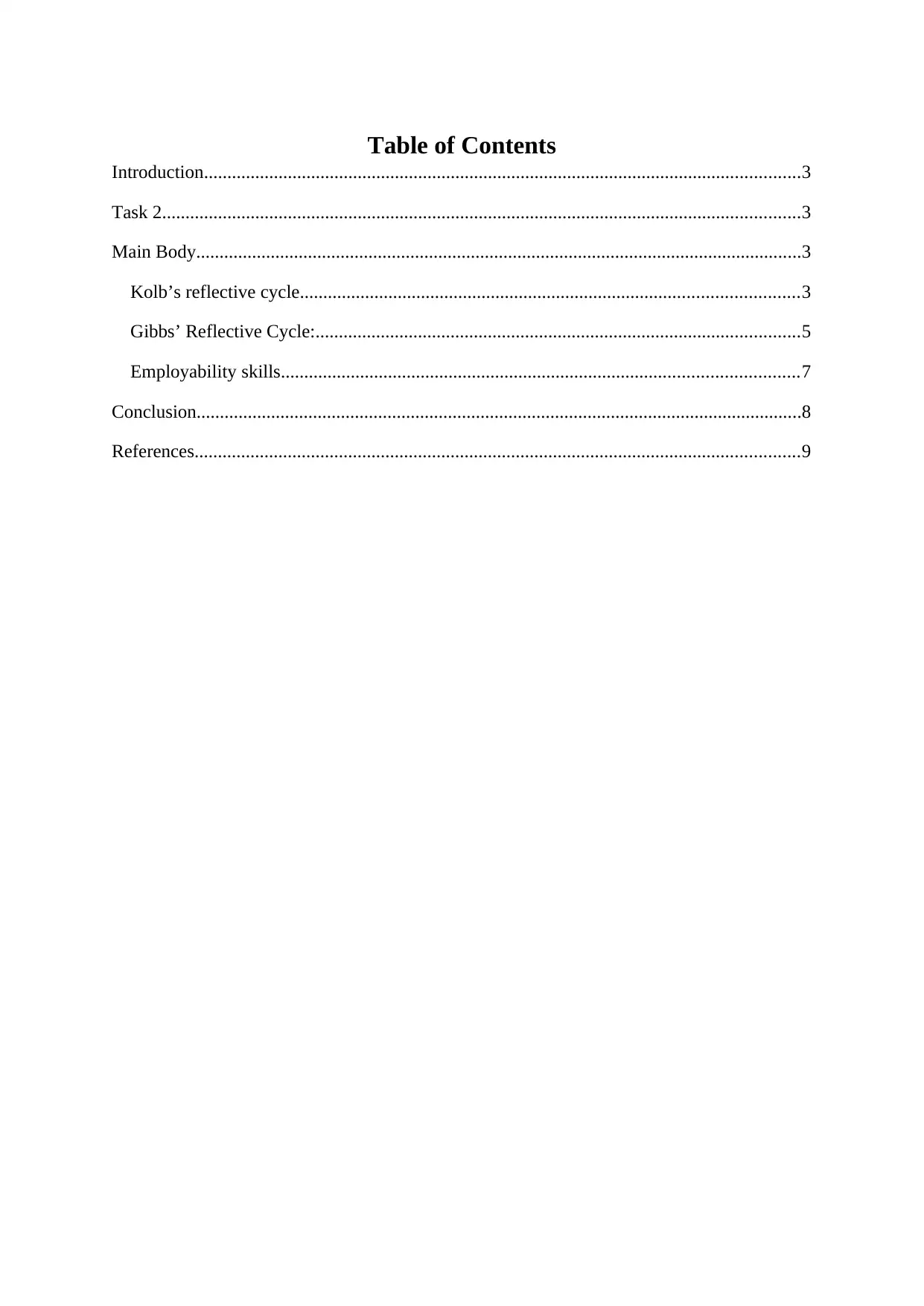
Table of Contents
Introduction................................................................................................................................3
Task 2.........................................................................................................................................3
Main Body..................................................................................................................................3
Kolb’s reflective cycle...........................................................................................................3
Gibbs’ Reflective Cycle:........................................................................................................5
Employability skills...............................................................................................................7
Conclusion..................................................................................................................................8
References..................................................................................................................................9
Introduction................................................................................................................................3
Task 2.........................................................................................................................................3
Main Body..................................................................................................................................3
Kolb’s reflective cycle...........................................................................................................3
Gibbs’ Reflective Cycle:........................................................................................................5
Employability skills...............................................................................................................7
Conclusion..................................................................................................................................8
References..................................................................................................................................9
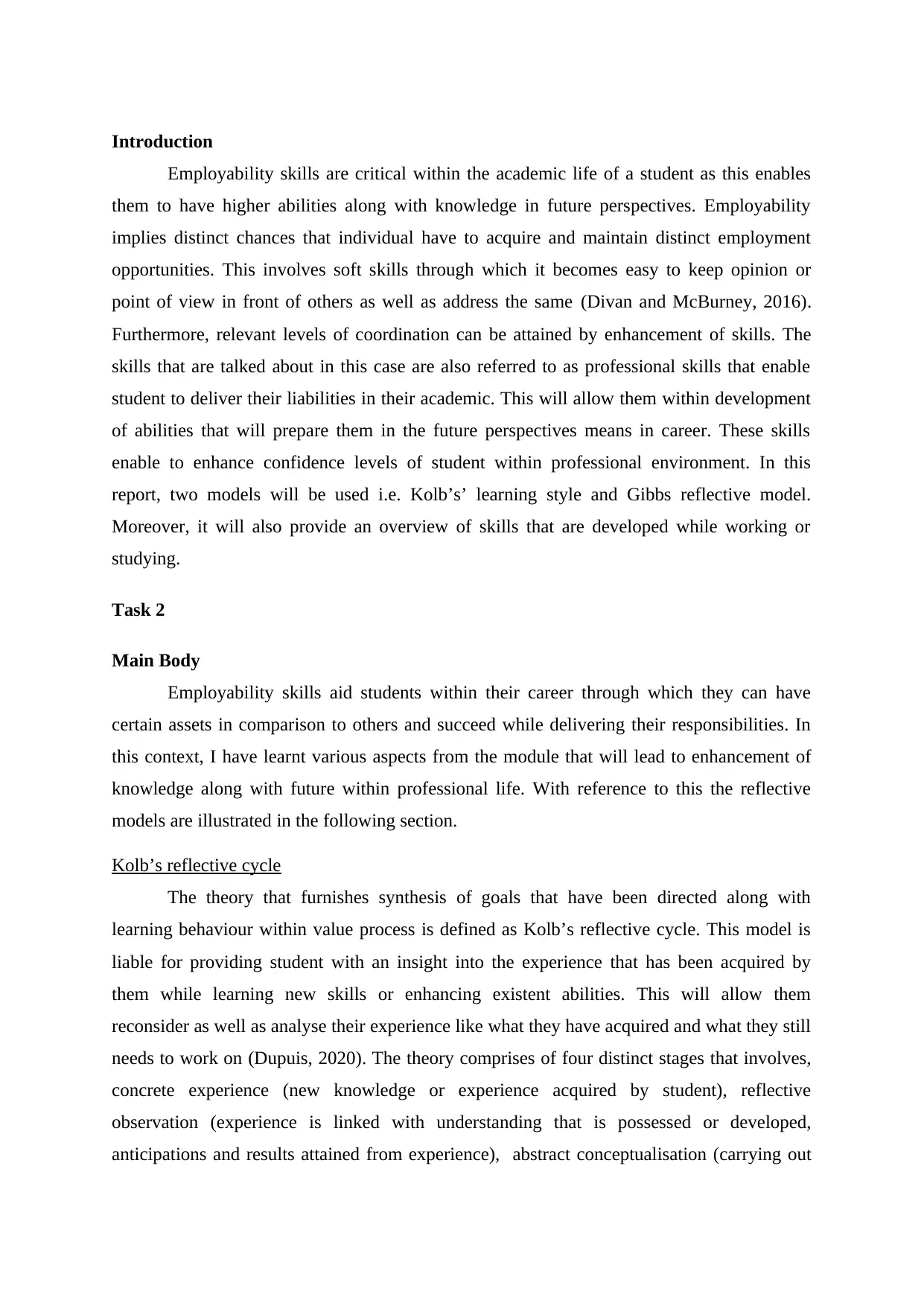
Introduction
Employability skills are critical within the academic life of a student as this enables
them to have higher abilities along with knowledge in future perspectives. Employability
implies distinct chances that individual have to acquire and maintain distinct employment
opportunities. This involves soft skills through which it becomes easy to keep opinion or
point of view in front of others as well as address the same (Divan and McBurney, 2016).
Furthermore, relevant levels of coordination can be attained by enhancement of skills. The
skills that are talked about in this case are also referred to as professional skills that enable
student to deliver their liabilities in their academic. This will allow them within development
of abilities that will prepare them in the future perspectives means in career. These skills
enable to enhance confidence levels of student within professional environment. In this
report, two models will be used i.e. Kolb’s’ learning style and Gibbs reflective model.
Moreover, it will also provide an overview of skills that are developed while working or
studying.
Task 2
Main Body
Employability skills aid students within their career through which they can have
certain assets in comparison to others and succeed while delivering their responsibilities. In
this context, I have learnt various aspects from the module that will lead to enhancement of
knowledge along with future within professional life. With reference to this the reflective
models are illustrated in the following section.
Kolb’s reflective cycle
The theory that furnishes synthesis of goals that have been directed along with
learning behaviour within value process is defined as Kolb’s reflective cycle. This model is
liable for providing student with an insight into the experience that has been acquired by
them while learning new skills or enhancing existent abilities. This will allow them
reconsider as well as analyse their experience like what they have acquired and what they still
needs to work on (Dupuis, 2020). The theory comprises of four distinct stages that involves,
concrete experience (new knowledge or experience acquired by student), reflective
observation (experience is linked with understanding that is possessed or developed,
anticipations and results attained from experience), abstract conceptualisation (carrying out
Employability skills are critical within the academic life of a student as this enables
them to have higher abilities along with knowledge in future perspectives. Employability
implies distinct chances that individual have to acquire and maintain distinct employment
opportunities. This involves soft skills through which it becomes easy to keep opinion or
point of view in front of others as well as address the same (Divan and McBurney, 2016).
Furthermore, relevant levels of coordination can be attained by enhancement of skills. The
skills that are talked about in this case are also referred to as professional skills that enable
student to deliver their liabilities in their academic. This will allow them within development
of abilities that will prepare them in the future perspectives means in career. These skills
enable to enhance confidence levels of student within professional environment. In this
report, two models will be used i.e. Kolb’s’ learning style and Gibbs reflective model.
Moreover, it will also provide an overview of skills that are developed while working or
studying.
Task 2
Main Body
Employability skills aid students within their career through which they can have
certain assets in comparison to others and succeed while delivering their responsibilities. In
this context, I have learnt various aspects from the module that will lead to enhancement of
knowledge along with future within professional life. With reference to this the reflective
models are illustrated in the following section.
Kolb’s reflective cycle
The theory that furnishes synthesis of goals that have been directed along with
learning behaviour within value process is defined as Kolb’s reflective cycle. This model is
liable for providing student with an insight into the experience that has been acquired by
them while learning new skills or enhancing existent abilities. This will allow them
reconsider as well as analyse their experience like what they have acquired and what they still
needs to work on (Dupuis, 2020). The theory comprises of four distinct stages that involves,
concrete experience (new knowledge or experience acquired by student), reflective
observation (experience is linked with understanding that is possessed or developed,
anticipations and results attained from experience), abstract conceptualisation (carrying out
⊘ This is a preview!⊘
Do you want full access?
Subscribe today to unlock all pages.

Trusted by 1+ million students worldwide
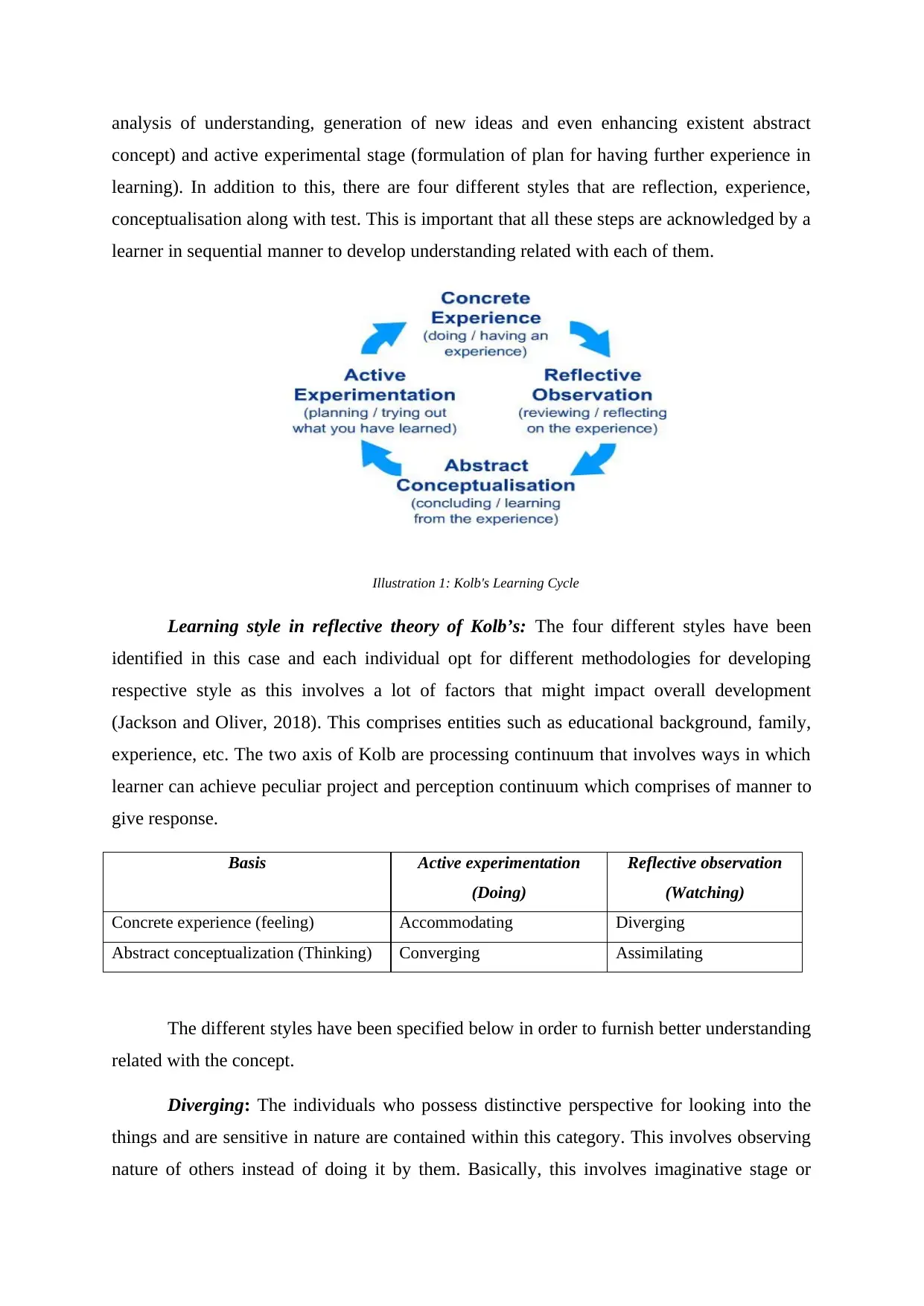
analysis of understanding, generation of new ideas and even enhancing existent abstract
concept) and active experimental stage (formulation of plan for having further experience in
learning). In addition to this, there are four different styles that are reflection, experience,
conceptualisation along with test. This is important that all these steps are acknowledged by a
learner in sequential manner to develop understanding related with each of them.
Learning style in reflective theory of Kolb’s: The four different styles have been
identified in this case and each individual opt for different methodologies for developing
respective style as this involves a lot of factors that might impact overall development
(Jackson and Oliver, 2018). This comprises entities such as educational background, family,
experience, etc. The two axis of Kolb are processing continuum that involves ways in which
learner can achieve peculiar project and perception continuum which comprises of manner to
give response.
Basis Active experimentation
(Doing)
Reflective observation
(Watching)
Concrete experience (feeling) Accommodating Diverging
Abstract conceptualization (Thinking) Converging Assimilating
The different styles have been specified below in order to furnish better understanding
related with the concept.
Diverging: The individuals who possess distinctive perspective for looking into the
things and are sensitive in nature are contained within this category. This involves observing
nature of others instead of doing it by them. Basically, this involves imaginative stage or
Illustration 1: Kolb's Learning Cycle
concept) and active experimental stage (formulation of plan for having further experience in
learning). In addition to this, there are four different styles that are reflection, experience,
conceptualisation along with test. This is important that all these steps are acknowledged by a
learner in sequential manner to develop understanding related with each of them.
Learning style in reflective theory of Kolb’s: The four different styles have been
identified in this case and each individual opt for different methodologies for developing
respective style as this involves a lot of factors that might impact overall development
(Jackson and Oliver, 2018). This comprises entities such as educational background, family,
experience, etc. The two axis of Kolb are processing continuum that involves ways in which
learner can achieve peculiar project and perception continuum which comprises of manner to
give response.
Basis Active experimentation
(Doing)
Reflective observation
(Watching)
Concrete experience (feeling) Accommodating Diverging
Abstract conceptualization (Thinking) Converging Assimilating
The different styles have been specified below in order to furnish better understanding
related with the concept.
Diverging: The individuals who possess distinctive perspective for looking into the
things and are sensitive in nature are contained within this category. This involves observing
nature of others instead of doing it by them. Basically, this involves imaginative stage or
Illustration 1: Kolb's Learning Cycle
Paraphrase This Document
Need a fresh take? Get an instant paraphrase of this document with our AI Paraphraser
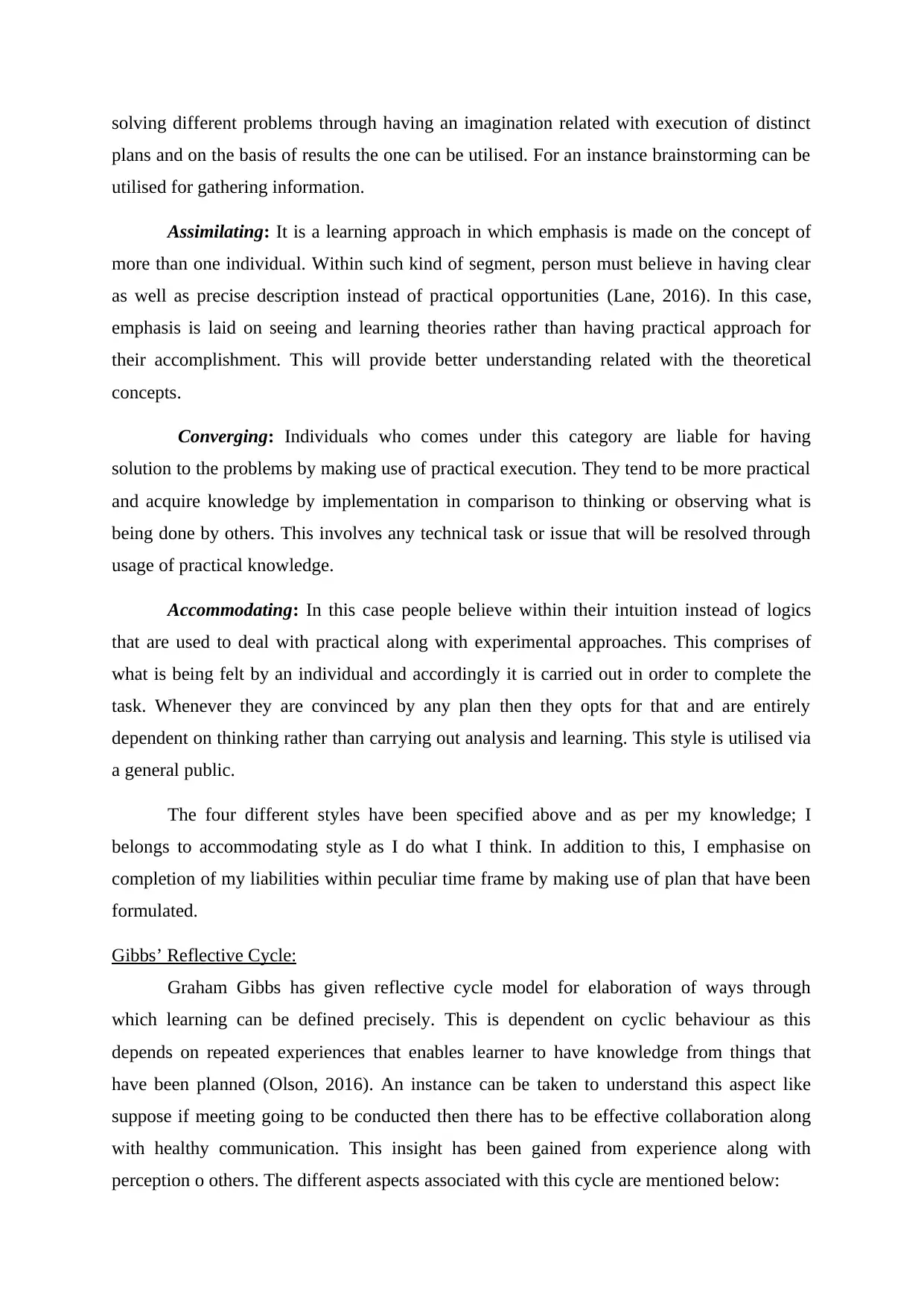
solving different problems through having an imagination related with execution of distinct
plans and on the basis of results the one can be utilised. For an instance brainstorming can be
utilised for gathering information.
Assimilating: It is a learning approach in which emphasis is made on the concept of
more than one individual. Within such kind of segment, person must believe in having clear
as well as precise description instead of practical opportunities (Lane, 2016). In this case,
emphasis is laid on seeing and learning theories rather than having practical approach for
their accomplishment. This will provide better understanding related with the theoretical
concepts.
Converging: Individuals who comes under this category are liable for having
solution to the problems by making use of practical execution. They tend to be more practical
and acquire knowledge by implementation in comparison to thinking or observing what is
being done by others. This involves any technical task or issue that will be resolved through
usage of practical knowledge.
Accommodating: In this case people believe within their intuition instead of logics
that are used to deal with practical along with experimental approaches. This comprises of
what is being felt by an individual and accordingly it is carried out in order to complete the
task. Whenever they are convinced by any plan then they opts for that and are entirely
dependent on thinking rather than carrying out analysis and learning. This style is utilised via
a general public.
The four different styles have been specified above and as per my knowledge; I
belongs to accommodating style as I do what I think. In addition to this, I emphasise on
completion of my liabilities within peculiar time frame by making use of plan that have been
formulated.
Gibbs’ Reflective Cycle:
Graham Gibbs has given reflective cycle model for elaboration of ways through
which learning can be defined precisely. This is dependent on cyclic behaviour as this
depends on repeated experiences that enables learner to have knowledge from things that
have been planned (Olson, 2016). An instance can be taken to understand this aspect like
suppose if meeting going to be conducted then there has to be effective collaboration along
with healthy communication. This insight has been gained from experience along with
perception o others. The different aspects associated with this cycle are mentioned below:
plans and on the basis of results the one can be utilised. For an instance brainstorming can be
utilised for gathering information.
Assimilating: It is a learning approach in which emphasis is made on the concept of
more than one individual. Within such kind of segment, person must believe in having clear
as well as precise description instead of practical opportunities (Lane, 2016). In this case,
emphasis is laid on seeing and learning theories rather than having practical approach for
their accomplishment. This will provide better understanding related with the theoretical
concepts.
Converging: Individuals who comes under this category are liable for having
solution to the problems by making use of practical execution. They tend to be more practical
and acquire knowledge by implementation in comparison to thinking or observing what is
being done by others. This involves any technical task or issue that will be resolved through
usage of practical knowledge.
Accommodating: In this case people believe within their intuition instead of logics
that are used to deal with practical along with experimental approaches. This comprises of
what is being felt by an individual and accordingly it is carried out in order to complete the
task. Whenever they are convinced by any plan then they opts for that and are entirely
dependent on thinking rather than carrying out analysis and learning. This style is utilised via
a general public.
The four different styles have been specified above and as per my knowledge; I
belongs to accommodating style as I do what I think. In addition to this, I emphasise on
completion of my liabilities within peculiar time frame by making use of plan that have been
formulated.
Gibbs’ Reflective Cycle:
Graham Gibbs has given reflective cycle model for elaboration of ways through
which learning can be defined precisely. This is dependent on cyclic behaviour as this
depends on repeated experiences that enables learner to have knowledge from things that
have been planned (Olson, 2016). An instance can be taken to understand this aspect like
suppose if meeting going to be conducted then there has to be effective collaboration along
with healthy communication. This insight has been gained from experience along with
perception o others. The different aspects associated with this cycle are mentioned below:
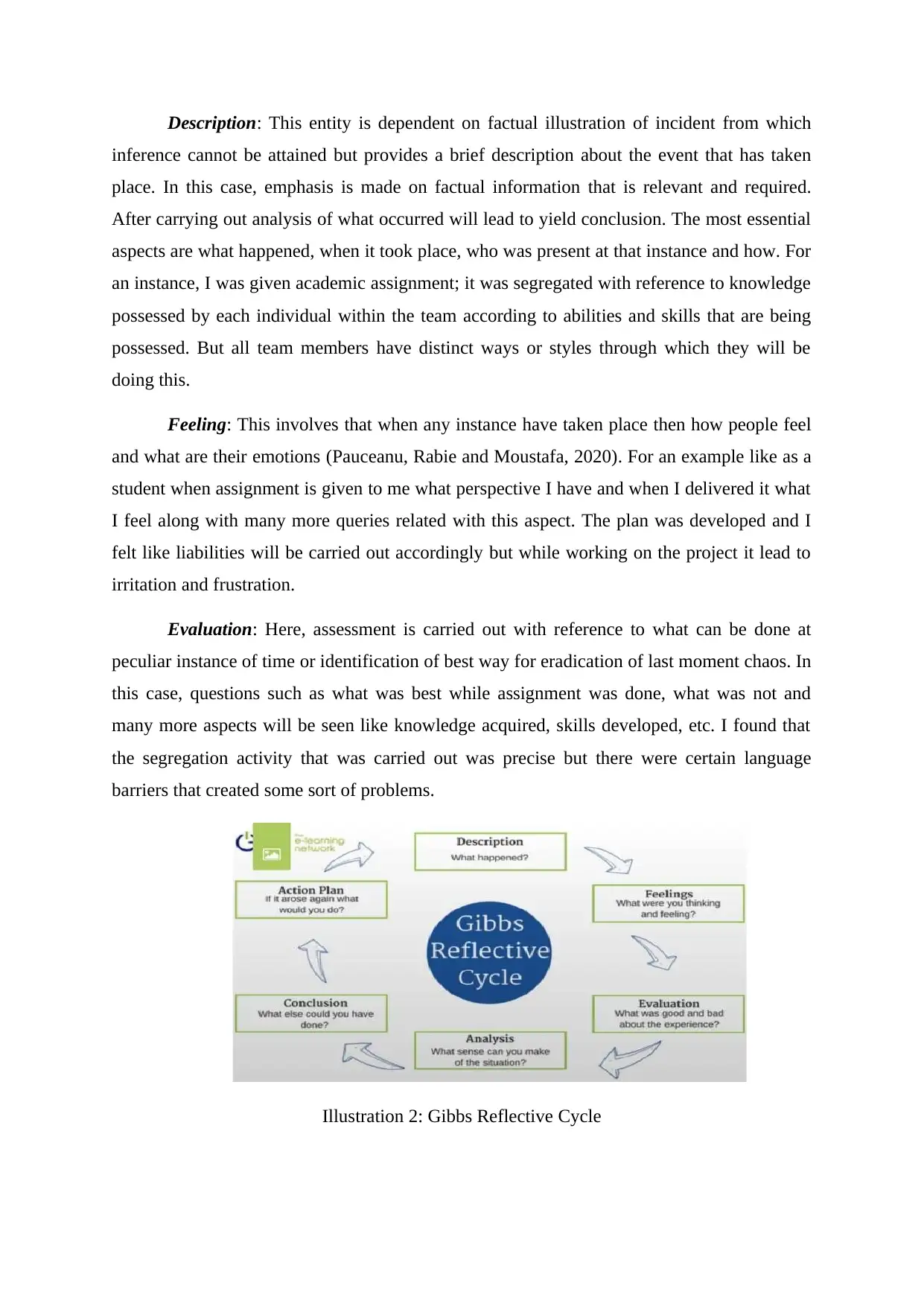
Description: This entity is dependent on factual illustration of incident from which
inference cannot be attained but provides a brief description about the event that has taken
place. In this case, emphasis is made on factual information that is relevant and required.
After carrying out analysis of what occurred will lead to yield conclusion. The most essential
aspects are what happened, when it took place, who was present at that instance and how. For
an instance, I was given academic assignment; it was segregated with reference to knowledge
possessed by each individual within the team according to abilities and skills that are being
possessed. But all team members have distinct ways or styles through which they will be
doing this.
Feeling: This involves that when any instance have taken place then how people feel
and what are their emotions (Pauceanu, Rabie and Moustafa, 2020). For an example like as a
student when assignment is given to me what perspective I have and when I delivered it what
I feel along with many more queries related with this aspect. The plan was developed and I
felt like liabilities will be carried out accordingly but while working on the project it lead to
irritation and frustration.
Evaluation: Here, assessment is carried out with reference to what can be done at
peculiar instance of time or identification of best way for eradication of last moment chaos. In
this case, questions such as what was best while assignment was done, what was not and
many more aspects will be seen like knowledge acquired, skills developed, etc. I found that
the segregation activity that was carried out was precise but there were certain language
barriers that created some sort of problems.
Illustration 2: Gibbs Reflective Cycle
inference cannot be attained but provides a brief description about the event that has taken
place. In this case, emphasis is made on factual information that is relevant and required.
After carrying out analysis of what occurred will lead to yield conclusion. The most essential
aspects are what happened, when it took place, who was present at that instance and how. For
an instance, I was given academic assignment; it was segregated with reference to knowledge
possessed by each individual within the team according to abilities and skills that are being
possessed. But all team members have distinct ways or styles through which they will be
doing this.
Feeling: This involves that when any instance have taken place then how people feel
and what are their emotions (Pauceanu, Rabie and Moustafa, 2020). For an example like as a
student when assignment is given to me what perspective I have and when I delivered it what
I feel along with many more queries related with this aspect. The plan was developed and I
felt like liabilities will be carried out accordingly but while working on the project it lead to
irritation and frustration.
Evaluation: Here, assessment is carried out with reference to what can be done at
peculiar instance of time or identification of best way for eradication of last moment chaos. In
this case, questions such as what was best while assignment was done, what was not and
many more aspects will be seen like knowledge acquired, skills developed, etc. I found that
the segregation activity that was carried out was precise but there were certain language
barriers that created some sort of problems.
Illustration 2: Gibbs Reflective Cycle
⊘ This is a preview!⊘
Do you want full access?
Subscribe today to unlock all pages.

Trusted by 1+ million students worldwide
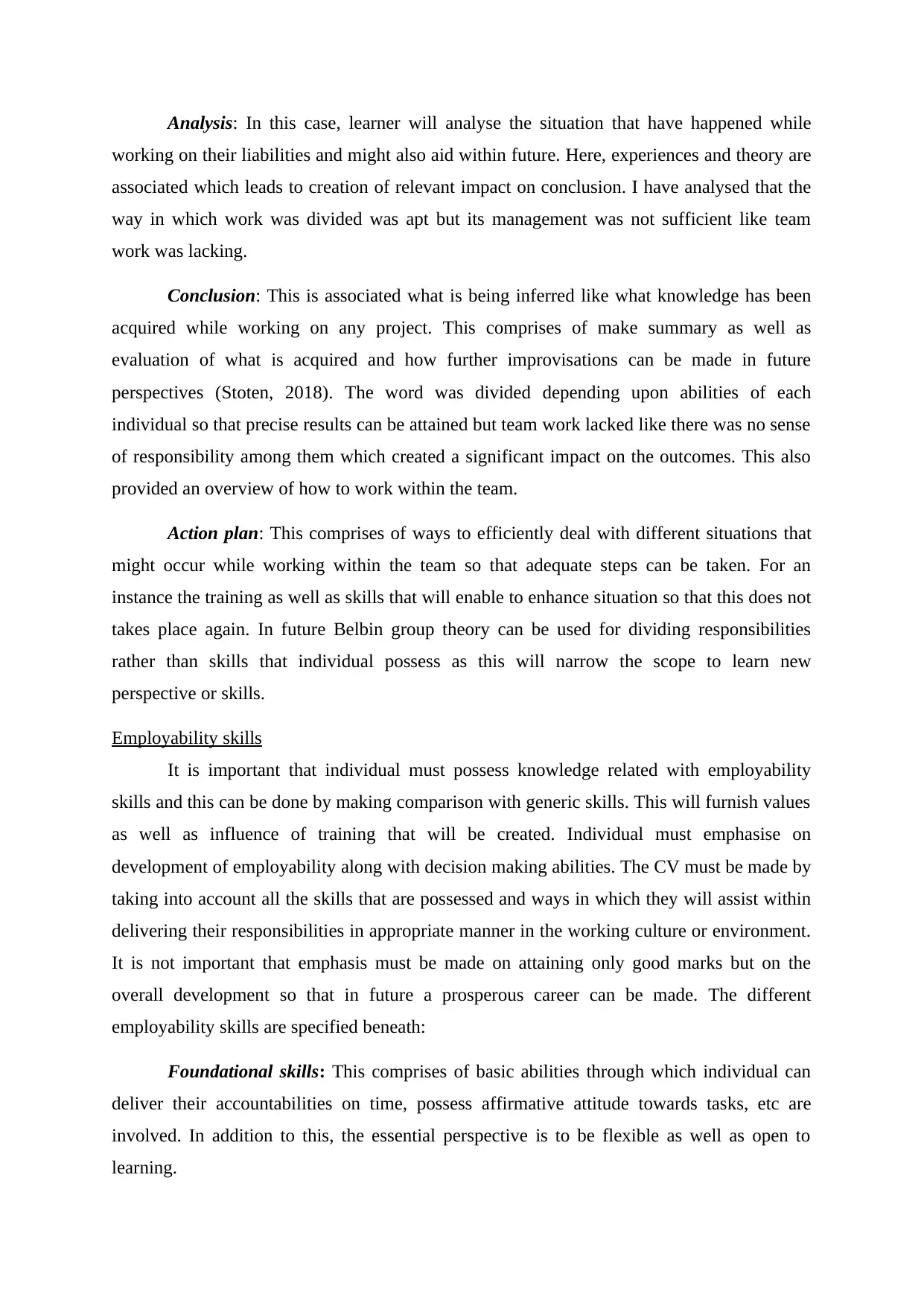
Analysis: In this case, learner will analyse the situation that have happened while
working on their liabilities and might also aid within future. Here, experiences and theory are
associated which leads to creation of relevant impact on conclusion. I have analysed that the
way in which work was divided was apt but its management was not sufficient like team
work was lacking.
Conclusion: This is associated what is being inferred like what knowledge has been
acquired while working on any project. This comprises of make summary as well as
evaluation of what is acquired and how further improvisations can be made in future
perspectives (Stoten, 2018). The word was divided depending upon abilities of each
individual so that precise results can be attained but team work lacked like there was no sense
of responsibility among them which created a significant impact on the outcomes. This also
provided an overview of how to work within the team.
Action plan: This comprises of ways to efficiently deal with different situations that
might occur while working within the team so that adequate steps can be taken. For an
instance the training as well as skills that will enable to enhance situation so that this does not
takes place again. In future Belbin group theory can be used for dividing responsibilities
rather than skills that individual possess as this will narrow the scope to learn new
perspective or skills.
Employability skills
It is important that individual must possess knowledge related with employability
skills and this can be done by making comparison with generic skills. This will furnish values
as well as influence of training that will be created. Individual must emphasise on
development of employability along with decision making abilities. The CV must be made by
taking into account all the skills that are possessed and ways in which they will assist within
delivering their responsibilities in appropriate manner in the working culture or environment.
It is not important that emphasis must be made on attaining only good marks but on the
overall development so that in future a prosperous career can be made. The different
employability skills are specified beneath:
Foundational skills: This comprises of basic abilities through which individual can
deliver their accountabilities on time, possess affirmative attitude towards tasks, etc are
involved. In addition to this, the essential perspective is to be flexible as well as open to
learning.
working on their liabilities and might also aid within future. Here, experiences and theory are
associated which leads to creation of relevant impact on conclusion. I have analysed that the
way in which work was divided was apt but its management was not sufficient like team
work was lacking.
Conclusion: This is associated what is being inferred like what knowledge has been
acquired while working on any project. This comprises of make summary as well as
evaluation of what is acquired and how further improvisations can be made in future
perspectives (Stoten, 2018). The word was divided depending upon abilities of each
individual so that precise results can be attained but team work lacked like there was no sense
of responsibility among them which created a significant impact on the outcomes. This also
provided an overview of how to work within the team.
Action plan: This comprises of ways to efficiently deal with different situations that
might occur while working within the team so that adequate steps can be taken. For an
instance the training as well as skills that will enable to enhance situation so that this does not
takes place again. In future Belbin group theory can be used for dividing responsibilities
rather than skills that individual possess as this will narrow the scope to learn new
perspective or skills.
Employability skills
It is important that individual must possess knowledge related with employability
skills and this can be done by making comparison with generic skills. This will furnish values
as well as influence of training that will be created. Individual must emphasise on
development of employability along with decision making abilities. The CV must be made by
taking into account all the skills that are possessed and ways in which they will assist within
delivering their responsibilities in appropriate manner in the working culture or environment.
It is not important that emphasis must be made on attaining only good marks but on the
overall development so that in future a prosperous career can be made. The different
employability skills are specified beneath:
Foundational skills: This comprises of basic abilities through which individual can
deliver their accountabilities on time, possess affirmative attitude towards tasks, etc are
involved. In addition to this, the essential perspective is to be flexible as well as open to
learning.
Paraphrase This Document
Need a fresh take? Get an instant paraphrase of this document with our AI Paraphraser
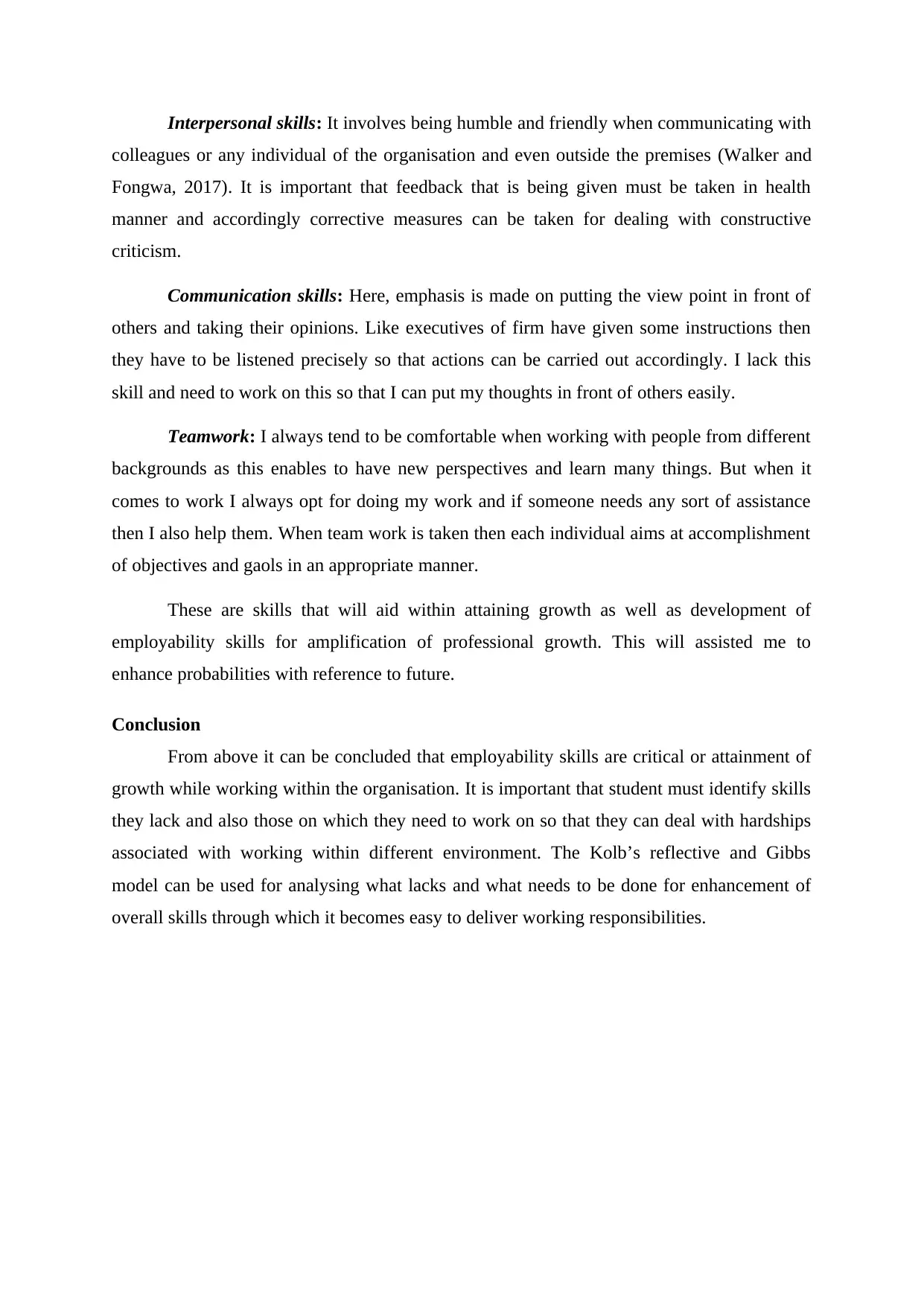
Interpersonal skills: It involves being humble and friendly when communicating with
colleagues or any individual of the organisation and even outside the premises (Walker and
Fongwa, 2017). It is important that feedback that is being given must be taken in health
manner and accordingly corrective measures can be taken for dealing with constructive
criticism.
Communication skills: Here, emphasis is made on putting the view point in front of
others and taking their opinions. Like executives of firm have given some instructions then
they have to be listened precisely so that actions can be carried out accordingly. I lack this
skill and need to work on this so that I can put my thoughts in front of others easily.
Teamwork: I always tend to be comfortable when working with people from different
backgrounds as this enables to have new perspectives and learn many things. But when it
comes to work I always opt for doing my work and if someone needs any sort of assistance
then I also help them. When team work is taken then each individual aims at accomplishment
of objectives and gaols in an appropriate manner.
These are skills that will aid within attaining growth as well as development of
employability skills for amplification of professional growth. This will assisted me to
enhance probabilities with reference to future.
Conclusion
From above it can be concluded that employability skills are critical or attainment of
growth while working within the organisation. It is important that student must identify skills
they lack and also those on which they need to work on so that they can deal with hardships
associated with working within different environment. The Kolb’s reflective and Gibbs
model can be used for analysing what lacks and what needs to be done for enhancement of
overall skills through which it becomes easy to deliver working responsibilities.
colleagues or any individual of the organisation and even outside the premises (Walker and
Fongwa, 2017). It is important that feedback that is being given must be taken in health
manner and accordingly corrective measures can be taken for dealing with constructive
criticism.
Communication skills: Here, emphasis is made on putting the view point in front of
others and taking their opinions. Like executives of firm have given some instructions then
they have to be listened precisely so that actions can be carried out accordingly. I lack this
skill and need to work on this so that I can put my thoughts in front of others easily.
Teamwork: I always tend to be comfortable when working with people from different
backgrounds as this enables to have new perspectives and learn many things. But when it
comes to work I always opt for doing my work and if someone needs any sort of assistance
then I also help them. When team work is taken then each individual aims at accomplishment
of objectives and gaols in an appropriate manner.
These are skills that will aid within attaining growth as well as development of
employability skills for amplification of professional growth. This will assisted me to
enhance probabilities with reference to future.
Conclusion
From above it can be concluded that employability skills are critical or attainment of
growth while working within the organisation. It is important that student must identify skills
they lack and also those on which they need to work on so that they can deal with hardships
associated with working within different environment. The Kolb’s reflective and Gibbs
model can be used for analysing what lacks and what needs to be done for enhancement of
overall skills through which it becomes easy to deliver working responsibilities.
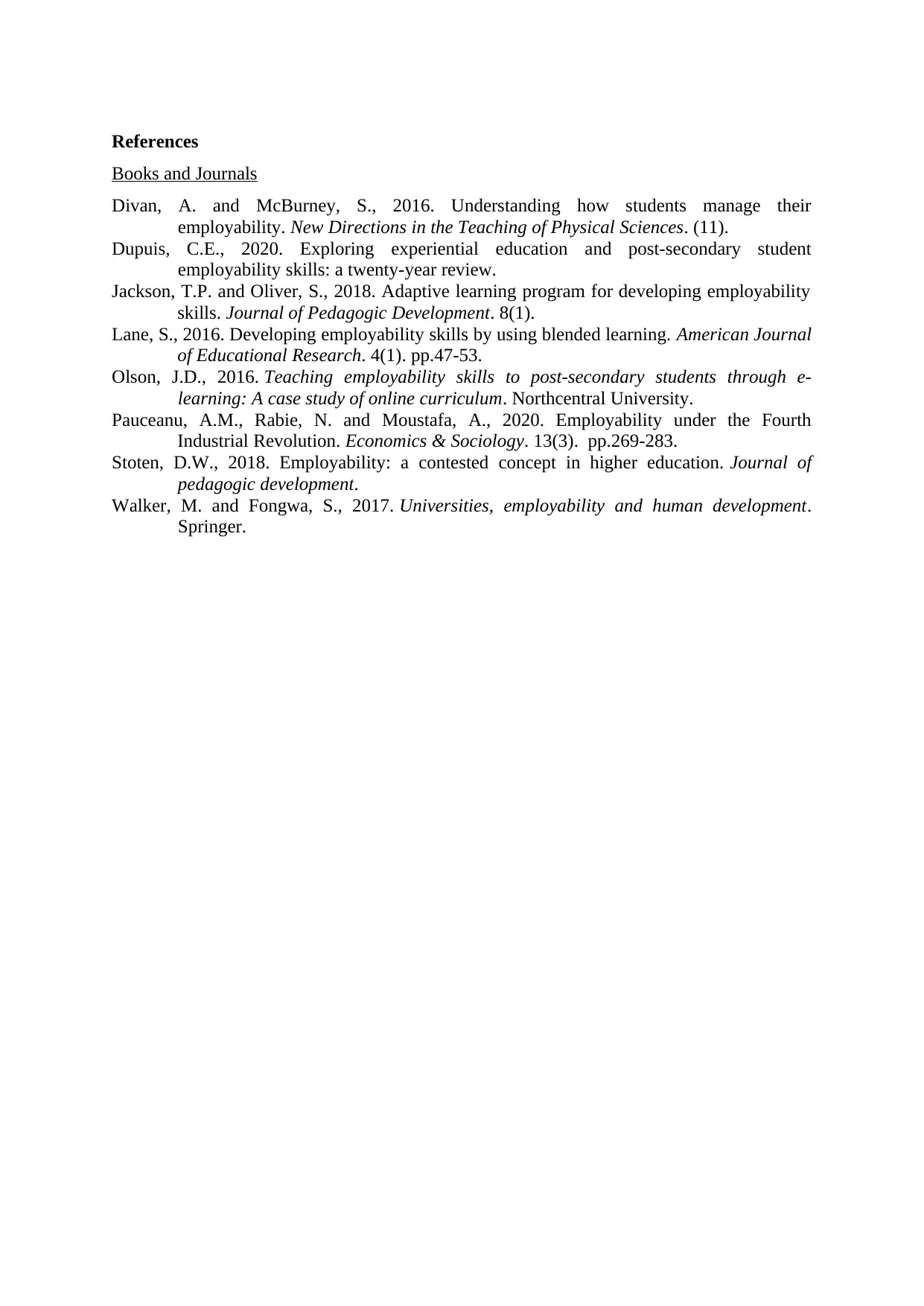
References
Books and Journals
Divan, A. and McBurney, S., 2016. Understanding how students manage their
employability. New Directions in the Teaching of Physical Sciences. (11).
Dupuis, C.E., 2020. Exploring experiential education and post-secondary student
employability skills: a twenty-year review.
Jackson, T.P. and Oliver, S., 2018. Adaptive learning program for developing employability
skills. Journal of Pedagogic Development. 8(1).
Lane, S., 2016. Developing employability skills by using blended learning. American Journal
of Educational Research. 4(1). pp.47-53.
Olson, J.D., 2016. Teaching employability skills to post-secondary students through e-
learning: A case study of online curriculum. Northcentral University.
Pauceanu, A.M., Rabie, N. and Moustafa, A., 2020. Employability under the Fourth
Industrial Revolution. Economics & Sociology. 13(3). pp.269-283.
Stoten, D.W., 2018. Employability: a contested concept in higher education. Journal of
pedagogic development.
Walker, M. and Fongwa, S., 2017. Universities, employability and human development.
Springer.
Books and Journals
Divan, A. and McBurney, S., 2016. Understanding how students manage their
employability. New Directions in the Teaching of Physical Sciences. (11).
Dupuis, C.E., 2020. Exploring experiential education and post-secondary student
employability skills: a twenty-year review.
Jackson, T.P. and Oliver, S., 2018. Adaptive learning program for developing employability
skills. Journal of Pedagogic Development. 8(1).
Lane, S., 2016. Developing employability skills by using blended learning. American Journal
of Educational Research. 4(1). pp.47-53.
Olson, J.D., 2016. Teaching employability skills to post-secondary students through e-
learning: A case study of online curriculum. Northcentral University.
Pauceanu, A.M., Rabie, N. and Moustafa, A., 2020. Employability under the Fourth
Industrial Revolution. Economics & Sociology. 13(3). pp.269-283.
Stoten, D.W., 2018. Employability: a contested concept in higher education. Journal of
pedagogic development.
Walker, M. and Fongwa, S., 2017. Universities, employability and human development.
Springer.
⊘ This is a preview!⊘
Do you want full access?
Subscribe today to unlock all pages.

Trusted by 1+ million students worldwide
1 out of 9
Related Documents
Your All-in-One AI-Powered Toolkit for Academic Success.
+13062052269
info@desklib.com
Available 24*7 on WhatsApp / Email
![[object Object]](/_next/static/media/star-bottom.7253800d.svg)
Unlock your academic potential
Copyright © 2020–2026 A2Z Services. All Rights Reserved. Developed and managed by ZUCOL.





